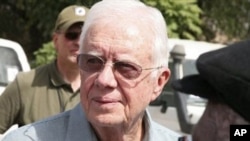Former U.S. President Jimmy Carter has praised southern Sudanese President Salva Kiir for uniting southern Sudanese in their latest effort to become Africa’s newest nation, depending on the outcome of this week’s referendum that ends Saturday.
Mr. Carter, however, warned that, because of high expectations, there could be disillusionment among southern Sudanese since, in his words, the circumstances in people’s lives are not going to change overnight.
Speaking to VOA, Mr. Carter also said Sudanese President Omar Hassan al-Bashir assured him that the north would bear the burden of the country’s debt since the new country should not be saddled with financial burdens.
“There has been some confusion about that and I’m not trying to speak for the government, but President Bashir told me that he did not see the need to divide the debt between north and south, which will be very complex, and will precipitate another very serious object for possible disagreement,” said the former president.
“The only concern I believe that President Bashir has is that he doesn’t want the international community to think that everybody is not involved. But, if the debt relief comes, the debt relief will have to come while the debt still exists. So, to let it stay in the north will mean the debt relief will come to the north. So, I think that is the easiest way to handle it.”
Sudanese officials have said at least 36 people have been killed in three days of tribal clashes in the country's oil-rich, but disputed Abyei district, a contested area along Sudan’s north-south border.
Mr. Carter said there are reasons to believe that neither the ruling National Congress Party (NCP) nor the Sudan People’s Liberation Movement (SPLM) are involved in the conflict.
“One good thing about that altercation in Abyei is I don’t believe that the forces of the north and south government were involved. This is primarily an altercation between the two tribal groups; the Ngok Dinka and the Misseriya, and I believe it is just a local altercation,” said President Carter.
“I think there has to be some effort by the international community to stop the violence and subsequently to investigate to find out who is to blame and to prevent a recurrence in the future.”
He also said that, during a meeting with Mr. Kiir, he discussed with the semi-autonomous southern Sudanese leader the need to improve the system of government to make it more inclusive and to protect human rights, as well as an overall improvement in the lives of the ordinary southern Sudanese.




